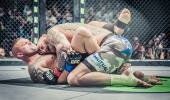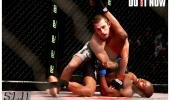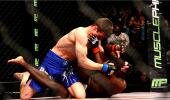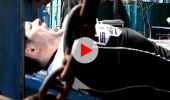Words by Morne Swanepoel / www.CombatCoaching.com
It was reported on BBC News that, “South Africa is the most dangerous country in the world, which is not at war.”
Sadly, this statement rings true when you consider that a rape occurs every 15 seconds, and this figure does not include child rapes, to average out at a horrifying 60 rapes per day, and more than 60 people are murdered every day in South Africa due to violent crime. SA government has admitted, for the first time, it was overwhelmed by crime. Deputy Minister of Justice, Johnny de Lange, told Parliament that the fight against crime was hopelessly paralysed by mistaken policy decisions, unprofessional personnel and a massive shortage of resources and accountability. He made this admission while presenting a review of the criminal justice system to the portfolio committees on justice and safety and security. ”The criminal justice system is ineffectual, as it is fragmented, dysfunctional and tainted by backlogs. The situation is sometimes so overwhelming that we don't know what to do about crime. We have not necessarily taken the right decisions over the past 15 years or used resources efficiently, and we now have to brace ourselves," he said.
The following crime story is true and occurs every minute in South Africa.
A Pretoria businessman died after being shot several times by armed robbers, who attacked him and his wife. According to police, 48-year-old John Cooper died in his bedroom. His wife, who was assaulted by the attackers, was taken to hospital. Paramedics rescued the couple's Rottweiler after it was poisoned by the attackers. Police spokesperson Captain Bonginkosi Msimango said Cooper, the owner of Westend Trailers, ran the trailer business from his house in Proclamation Hill. Just after 01h00 on Sunday, five armed men entered the house and confronted Cooper and his wife, who has not been named. "They shot the man. We cannot say how many times at this stage. He died in the bedroom. The robbers then ordered the wife to give them money. She opened the safe and the robbers fled with an undisclosed amount," Msimango said. Churches are increasingly becoming soft targets for brazen criminals who rape and rob congregants during church services, representatives of Churches in South Africa said. "Criminals are now targeting churches because they know that congregants are not armed.” All South Africans know that in the past 15 years there has been an abnormal increase in violence and crime. Hardly a minute goes by without news of an assault, rape, murder, hijacking, home invasion or some other type of violent crime – most often against innocent people quietly going about their normal everyday lives. To reduce the danger of being attacked in the street or at home, of being the victim of a crime or simply being in the wrong place at the wrong time, it has become imperative for law-abiding citizens to learn how to defend themselves and protect their property effectively.
May the biggest stick win
In a bygone era, when life was all about sabre-toothed cats and wooden clubs, toughness was measured by the size of your weapon (wooden club) and conflict was usually won by the wielder of the biggest stick. It must have been awfully confusing back then for the biggest-stick carrier (let’s call him Barry), when he was trounced, time and time again by a small cave dweller, who never carried anything larger than a birch twig. Very soon, in a series of one-sided skirmishes, Big Stick Barry had lost his wife, club and collection of shrew skulls to the devilish twig wielder. What Barry learnt very quickly was that there is more to being tough than big sticks, and if Small Twig man could learn it, then so could he.
Welcome to the tough club
In that respect, very little has changed over the last few thousand years. No matter whether you’re facing a mugger in a parking lot, or a drunken football fan after his side just got trounced by the competition, there are certain elements that will either work for or against you in your efforts to survive. Your strength, reflexes, surroundings, mental awareness and fear all need to be handled correctly to triumph. Surprisingly enough, mastery over these elements doesn’t come naturally to all of us. Such mastery needs to be learned, nay, ingrained into the very fibre of our being, so that when the surge of adrenaline grips us late one night in a poorly lit back alley, we are able to rise to the occasion and show the world, or at least our would-be attacker, what toughness personified looks like. Are you ready for the transformation?
Fatal schoolboy errors
You will never rise to the level of your expectations, but rather fall to the level of your training! Another rookie mistake people make is not only to overestimate your own abilities, but to underestimate your attacker’s. A 12-year-old with a knife in his hand is a very dangerous threat; he may not look like it at first, but age doesn’t come into the equation here. If you are being confronted or attacked by someone who is seemingly smaller or weaker than you, remember that, more often than not, they pose a very real threat, or they would not have confronted you in the first place. A part of being tough in Africa means having a realistic idea of the threat you’re facing. Possibly one of the biggest mistakes that untrained people make is to think that only the other person will get hurt in a fight. The truth is that if you find yourself in a fist fight, prepare to get hit. And if you land yourself in a knife fight, be prepared to get cut!
Training tough
There are both mental and physical aspects to preparing yourself for survival on the streets. When students progress in their training, there is a definite change taking place mentally and physically. One becomes ‘tougher’ as you learn to deal with the physical contact of your training partners, but you also become more aware of your strengths and weaknesses. You learn what your body will allow you to do – depending on your fitness, age, body structure and so on. You become mentally tougher by learning to hang in there when training pushes you to your limits. Perseverance is an important aspect to handling a violent attack, as you need to be able to endure and do what is necessary to survive a situation.
Freeze, this is a stick-up
The problem for most people, however, is that when faced by an attacker, whether it’s a seven-foot behemoth making passes at our wives, or a hijacker at a traffic intersection, we freeze up and fail to do anything at all. Under high levels of stress, our sympathetic nervous system (SNS) kicks into action. The SNS sets about preparing your body for battle, without really consulting anyone important such as the brain, for instance. “The SNS releases hormones or adrenaline into your blood stream to make your body stronger, faster and sometimes even anaesthetised to pain,” says Geoff Thompson, author of Dead or Alive: The Definitive Self-Protection Book. “The more dangerous the situation, the bigger the adrenalin release. The bigger the release, the better you perform, but by the same count, the bigger the release, the harder it is to control,” continues Geoff. In a flash, your pupils are dilated, your heart rate increases, your brain has all the blood it could possibly want and less important functions, like digestion, have their blood supply dramatically reduced, which explains the sinking feeling in the pit of your stomach.With all of this going on, the result is that you may not be able to see the same, think the same, or move in the same way. Therefore, we must try to understand how stress affects us so that we can anticipate the changes. Our bodily responses are there to heighten our mental and physical abilities, but if we are unfamiliar with the symptoms that come with a surge of adrenaline, we are left shaky, nauseous and rooted to the spot. Our lack of action gives the attacker complete power to decide what happens next.
This brings us to a point where we can actually learn something from Big Stick Barry, despite all his defeats. In primeval days when man had to fight to live and eat, the feeling of fear was an everyday occurrence that would have felt as natural as eating or drinking. In today's society, some people go through a whole lifetime without ever experiencing it fully. So when a situation arises that causes the adrenalin to flow, we are so unfamiliar with it that we naturally neither welcome nor like it. We panic. The best way to deal with this is to ‘rehearse’ or expose oneself to these scenarios and force-on-force training, within the correct training environment.In a violent conflict a cry for help is sent to the subconscious mind, which digs around for an appropriate answer. Instead it comes up with an ‘error’ message – ‘there is no information on this subject’. That’s why one freezes up. So you need to feed the correct information into your brain and this is done through correct, meticulous and repetitive training.
Being the hard target
Being tough begins long before the much spoken about do-or-die moment, and means possessing survival instinct and awareness. Every time your brain senses danger it goes through four steps (OODA): observation, orientation, decision making and action. It never changes the order, or skips a step. Being aware of this process will set you well on your way to avoiding possible nasty situations. By constantly observing your surroundings you can give yourself far more time to react to possible danger. The images you see are packed with information; someone walking towards you, a car blocking your path, the sight of a knife, or the intention in an attacker’s eyes. Your brain then orients you in relation to the threat. Is it immediate, or do you have some time to escape? Do I have the upper hand or not? After working these details out, you are now in a position to decide on the best course of action – to run, fight, or even comply with a mugger’s demands. Once you’ve made this decision you need to follow through with your action immediately. A second’s hesitation can change your fate in a conflict situation. “That’s all very well,” you might say, “But how do I know what to look for. After all, one can’t predict the future.” And it’s true – you can’t predict the future. But there are some things you can look out for when dealing with potential violent characters. When you are approached by someone, look out for a red flushed face, rapid and shallow breathing, a fixed stare, or a rigid body. More pointers to help identify those bad characters include shaky hands or clenched fists, irrational behaviour and any signs that the person is under the influence of drugs or alcohol.
Choose flight
So you’re prepared to get punched, you’ve learnt to control your adrenaline, you know how to pick out a shady character, so surely it’s fight time, right? As the great Braveheart once said, “We didn’t get all dressed up for nothing.” But, sadly, for fight clubbers there is still one more obstacle to overcome on the path to true toughness – and it’s a biggie! Gentleman, may I welcome into the ring, weighing in at almost nothing, but very capable of fatal damage, your ego. Although the various approaches to self-defense differ, the one thing everyone agrees on is that escaping conflict is always first prize. Proper training should open your eyes to the world around you. It should enable you to make an informed and unemotional decision to avoid conflict wherever possible. But what about when your dignity is stripped, or your pride wounded? What happens when my lovely wife is insulted by a smelly, beer-swilling miscreant? Surely a tough guy defends his wife’s dignity? Well, that depends on your perspective. Being tough is about being principled, steadfast and disciplined. What your ego will do is to propel some inappropriate behaviour into full-blown public violence, which carries with it not only the risk of injury or death, whether intentional or accidental, but also some fairly serious legal consequences. An insult to one’s dignity, or your wife’s for that matter, seems a small price to pay to avoid that. And that’s a tough decision to have to make.
Catch the second part of surviving in South Africa in the next issue of DO IT NOW, where I will expand on how tough guys should handle conflict.











